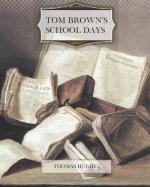The sixth-form boys had not yet appeared; so, to fill up the gap, an interesting and time-honoured ceremony was gone through. Each new boy was placed on the table in turn, and made to sing a solo, under the penalty of drinking a large mug of salt and water if he resisted or broke down. However, the new boys all sing like nightingales to-night, and the salt water is not in requisition—Tom, as his part, performing the old west-country song of “The Leather Bottel” with considerable applause. And at the half-hour down come the sixth and fifth form boys, and take their places at the tables, which are filled up by the next biggest boys, the rest, for whom there is no room at the table, standing round outside.
The glasses and mugs are filled, and then the fugleman strikes up the old sea-song,
“A wet sheet and
a flowing sea,
And a wind that follows
fast,” etc.,
which is the invariable first song in the School-house; and all the seventy voices join in, not mindful of harmony, but bent on noise, which they attain decidedly, but the general effect isn’t bad. And then follow “The British Grenadiers,” “Billy Taylor,” “The Siege of Seringapatam,” “Three Jolly Postboys,” and other vociferous songs in rapid succession, including “The Chesapeake and Shannon,” a song lately introduced in honour of old Brooke; and when they come to the words,
“Brave Broke he
waved his sword, crying, Now, my lads, aboard,
And we’ll stop
their playing Yankee-doodle-dandy oh!”
you expect the roof to come down. The sixth and fifth know that “brave Broke” of the Shannon was no sort of relation to our old Brooke. The fourth form are uncertain in their belief, but for the most part hold that old Brooke was a midshipman then on board his uncle’s ship. And the lower school never doubt for a moment that it was our old Brooke who led the boarders, in what capacity they care not a straw. During the pauses the bottled-beer corks fly rapidly, and the talk is fast and merry, and the big boys—at least all of them who have a fellow-feeling for dry throats—hand their mugs over their shoulders to be emptied by the small ones who stand round behind.
Then Warner, the head of the house, gets up and wants to speak; but he can’t, for every boy knows what’s coming. And the big boys who sit at the tables pound them and cheer; and the small boys who stand behind pound one another, and cheer, and rush about the hall cheering. Then silence being made, Warner reminds them of the old School-house custom of drinking the healths, on the first night of singing, of those who are going to leave at the end of the half. “He sees that they know what he is going to say already” (loud cheers), “and so won’t keep them, but only ask them to treat the toast as it deserves. It is the head of the eleven, the head of big-side football, their leader on this glorious day—Pater Brooke!”
And away goes the pounding and cheering again, becoming deafening when old Brooke gets on his legs; till, a table having broken down, and a gallon or so of beer been upset, and all throats getting dry, silence ensues, and the hero speaks, leaning his hands on the table, and bending a little forwards. No action, no tricks of oratory—plain, strong, and straight, like his play.




